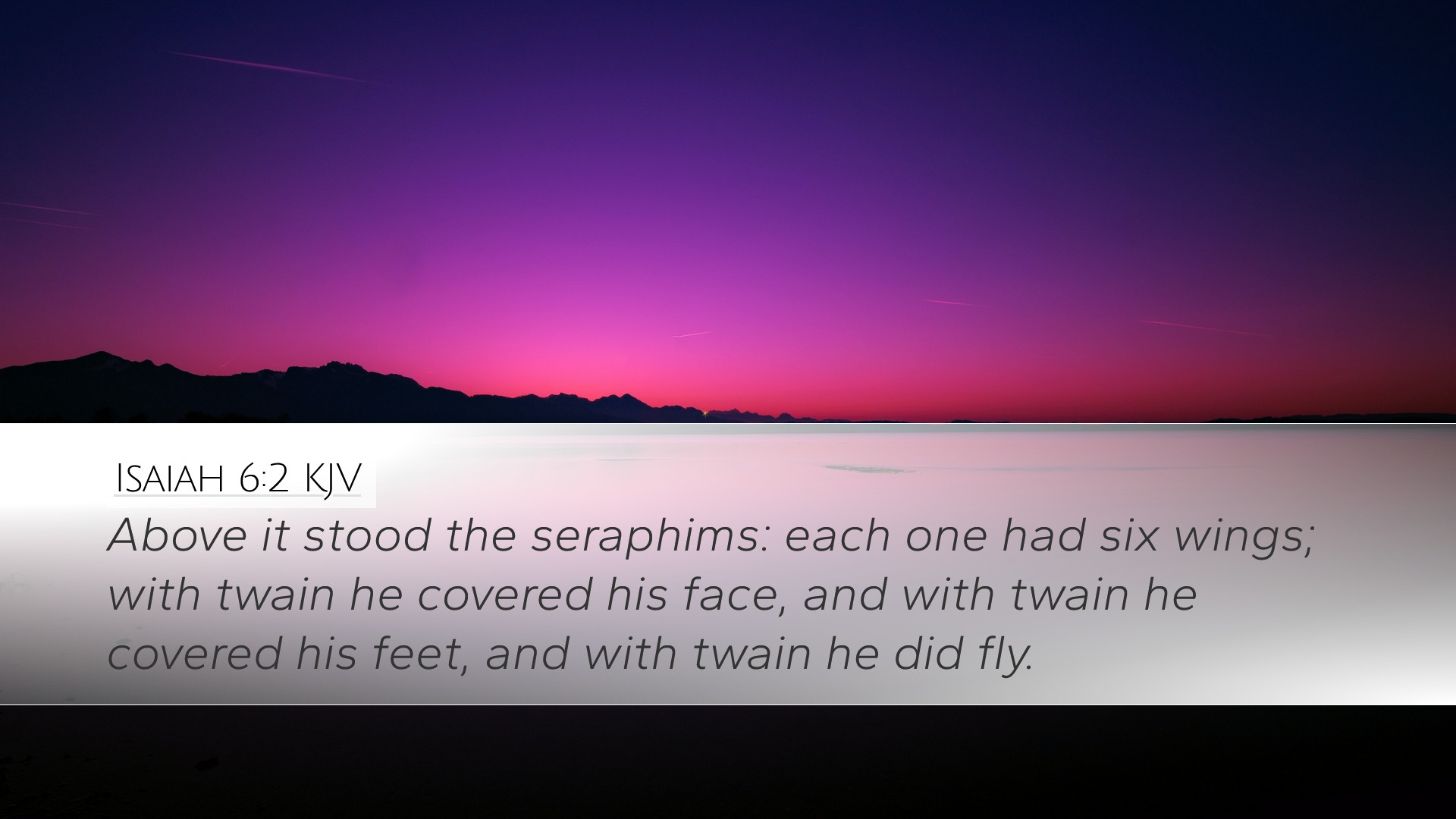Commentary on Isaiah 6:2
Isaiah 6:2 states, "Above it stood the seraphims: each one had six wings; with twain he covered his face, and with twain he covered his feet, and with twain he did fly." This verse introduces a magnificent vision seen by the prophet Isaiah in the temple, emphasizing the holiness and majesty of God. Below is a compiled commentary derived from several public domain sources, intended for the benefit of pastors, students, theologians, and Bible scholars.
1. Context and Significance of the Vision
Matthew Henry notes that this vision occurs during a significant period in Judah, particularly after the death of King Uzziah. This context accentuates Isaiah's need to receive divine comfort and guidance amidst national uncertainty. The vision of God upon His throne conveys the message that despite earthly leaders' demise, God remains sovereign and exalted.
Albert Barnes elaborates on the meaning of “the year that King Uzziah died.” The king’s passing was not only political but also a spiritual crisis. Uzziah was known for his strength and success, yet his later pride ultimately led to his downfall. In contrast, this divine revelation of God’s grandeur reminds believers that true authority lies with the Almighty.
2. The Character of the Seraphim
The seraphim mentioned in this verse are unique celestial beings that serve God in His glorious presence. Adam Clarke explains that the term "seraphim" literally means "burning ones," indicating their purity and fervent love for God. This fiery aspect symbolizes their dedicated service and profound reverence for the holiness of God.
Functions of the Seraphim
- Worship: The seraphim's primary role is to worship God continuously. Their act of covering their faces signifies an acknowledgment of God’s overwhelming holiness.
- Messengers: While not explicitly stated in this verse, seraphim often serve as messengers, as illustrated in other scriptures.
- Purifiers: In the subsequent verses, one seraph cleanses Isaiah's lips with a coal, symbolizing the purifying of his sinful nature.
3. Symbolism of the Wings
The seraphim are depicted as having six wings, each serving distinct purposes:
- Covering the Face: As described by Matthew Henry, seraphim cover their faces to shield themselves from the radiance of God's glory, illustrating the concept that no creature can approach God’s holiness without reverence and awe.
- Covering the Feet: According to Albert Barnes, this symbolizes humility. Covering their feet denotes a posture of submission, acknowledging that even these exalted beings are unworthy in the presence of God.
- Flying: The ability to fly signifies their readiness to serve and execute the commands of God swiftly, reflecting the urgency and promptness of divine service.
4. Implications for Worship
The imagery and actions of the seraphim challenge contemporary worship practices. Adam Clarke argues that understanding the nature of divinity as presented in this vision should inspire believers to approach God with reverence. The manner in which the seraphim worship could furnish a model for approaching God's presence, igniting a desire for deeper holiness and the alignment of one's life with God's character.
Call to Holiness
Matthew Henry comments on how this vision serves as a call to holiness for Isaiah and the nation as a whole. Encountering God’s purity compels an individual to acknowledge their own sinfulness and need for repentance. The juxtaposition of divine perfection against human imperfection emphasizes the transformative power of a genuine encounter with God.
5. Conclusion: The Ongoing Impact of Isaiah’s Vision
The vision in Isaiah 6:2 not only captivates the imagination of believers but also serves as a template for understanding God’s transcendence. As Albert Barnes succinctly points out, the scene exhibits God’s supreme authority and holiness, calling all creation to recognize their place before the Creator.
This text urges readers to acknowledge their relationship with God and the need for continual humility and reverence in worship. For pastors and theologians, Isaiah’s experience invites contemplation on the nature of divine presence and the necessity for both an authentic and humble approach to ministry.
In summary, Isaiah 6:2 provides profound insights into the nature of God, the response of heavenly beings, and the ultimate call to holiness for all who encounter Him.


